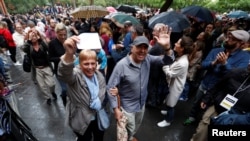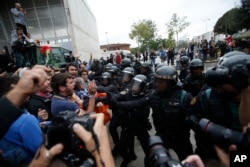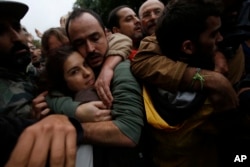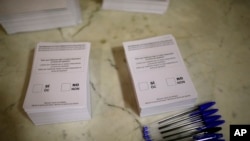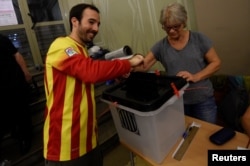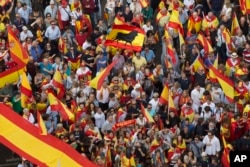Spanish riot police fired rubber projectiles at protesters outside a Barcelona polling station during Catalonia’s disputed independence referendum. Several people have been wounded.
The officers fired the projectiles to clear protesters who were trying to keep National Police cars from leaving with ballot boxes police confiscated from the voting center.
The police had smashed their way into the polling station, using hammers and lock cutters, where Catalonia’s regional leader had been scheduled to vote. Scuffles erupted outside between police and people waiting to vote.
An AP photographer saw several people who had been injured during the scuffles outside Barcelona’s Rius i Taule school, where some voters had cast ballots before police arrived.
Clashes broke out less than an hour after polls opened and not long before Catalonia regional president Carles Puigdemont was expected to arrive to vote. Polling station workers inside the building reacted peacefully and broke into songs and chants challenging the officers’ presence.
Spain: No force, but no vote
The Spanish government and its security forces are trying to prevent voting in the independence referendum, which is backed by Catalan regional authorities. Spanish officials had said force wouldn’t be used, but that voting wouldn’t be allowed.
The unfolding confrontation has rattled Spain’s political and constitutional framework.
The country’s Constitutional Court has suspended the vote, and the Spanish central government says it’s illegal. Regional separatist leaders had pledged to hold it anyway, promising to declare independence if the “yes” side wins, and called on 5.3 million eligible voters to cast ballots.
Police sealed off many voting centers in the hours before the vote to prevent their use. Others were filled with activists determined to hold their ground.
Puigdemont voted in Cornella de Terri, near the northern city of Girona, after police took over control of the polling center where he was originally scheduled to appear, his spokesman Joan Maria Pique told The Associated Press.
Puigdemont has spearheaded the separatist push to go ahead with the vote, despite a Constitutional Court suspension and fierce opposition by central authorities.
Spanish riot police forcefully removed a few hundred would-be voters from that polling station, a school in Barcelona.
'They took everything'
Daniel Riano was inside when the police pushed aside a large group gathered outside busted in the Estela school’s front door.
The 54-year-old Riano said that “we were waiting inside to vote when the National Police used force to enter, they used a mace to break in the glass door and they took everything.”
He said that “one policeman put me in a headlock to drag me out, while I was holding my wife’s hand. It was incredible. They didn’t give any warning.”
National Police and Civil Guard officers also showed up in other polling centers where Catalan officials were expected.
Defying rain, police
Catalans braved rain and defied police orders to abandon designated voting stations.
Joaquim Bosch, a 73-year-old retiree at Princep de Viana high school, where a crowd of 20 people was growing Sunday morning, said he was uneasy about a possible police response to the crowds.
“I have come to vote to defend the rights of my country, which is Catalonia,” Bosch said. “I vote because of the mistreatment of Catalonia by Spain for many years.”
Reporters with The Associated Press saw ballot boxes wrapped in plastic bags being carried into some of the polling stations in Barcelona occupied by parents, children and activists before some polling stations could open at 9 a.m. (0700 GMT) as scheduled.
The plastic ballot boxes, bearing the seal of the Catalan regional government, were placed on tables, prompting the cheering of hopeful voters who had gathered in schools before dawn.
Some 2,300 facilities had been designated as polling stations, but it was unclear how many were able to open. The Ministry of Interior didn’t provide a number late on Saturday when it said that most of them had been sealed off and that only some remained occupied by activists determined to vote.
Police were under orders to confiscate ballots and ballot boxes.
Regional government spokesman Jordi Turull also said that a group of “academics and professionals” would serve as election observers. The official electoral board appointed by the regional parliament was disbanded last week to avoid hefty fines by Spain’s Constitutional Court.
“We are under conditions to be able to celebrate a self-determination referendum with guarantees,” Turull said in a press conference. “Our goal is that all Catalans can vote.”
Tension has been on the rise since the vote was called in early September, crystalizing years of defiance by separatists in the affluent region, which contributes a fifth of Spain’s 1.1 trillion-euro economy ($1.32 trillion.)
Courts and police have been cracking down for days to halt the vote, confiscating 10 million paper ballots and arresting key officials involved in the preparations. On Saturday, Civil Guard agents dismantled the technology to connect voting stations, count the votes and vote online, leading the Spanish government to announce that holding the referendum would be “impossible.”
No minimum turnout has been set for the validity of the vote by Catalan authorities. Regional government officials initially hoped for a turnout greater than the 2.3 million people who voted in a mock referendum in 2014 in which 80 percent favored independence but have recently signaled that they would consider the vote valid with a lower number given the challenges to hold it.




